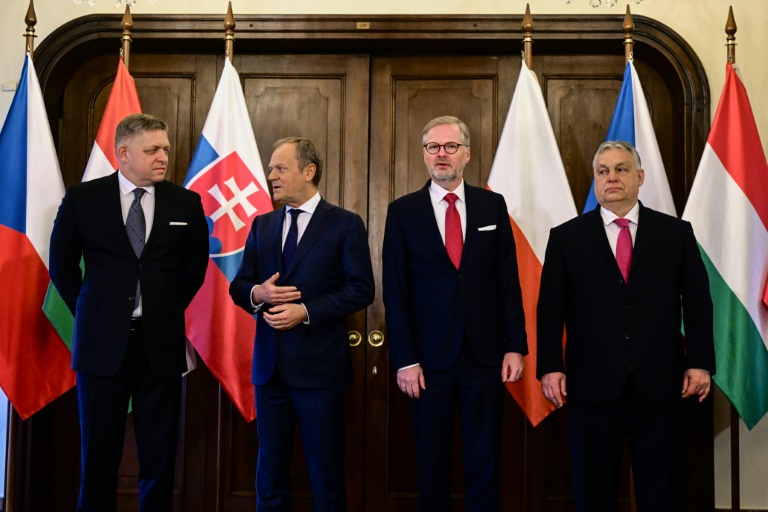Four ex-communist central European countries said Tuesday they were not planning to send troops to Ukraine as they remained torn on military aid to the war-ravaged country battling Russia’s invasion.
The Czech, Hungarian, Polish and Slovak prime ministers spoke one day after French President Emmanuel Macron refused to rule out the dispatch of Western ground troops to Ukraine “to ensure that Russia cannot win this war”.
Prague and Warsaw are calling for increased military aid to Ukraine, while Bratislava and Budapest are against.
But all four EU and NATO members forming the so-called Visegrad Group said they would not send ground troops to Ukraine.
“We are not considering sending our troops to Ukraine and we have a common position on this point” with the Czech Republic, Polish Prime Minister Donald Tusk said after meeting Czech counterpart Petr Fiala for bilateral talks in Prague.
“Today, we have to concentrate, like the Polish and Czech governments have done, on supporting Ukraine fully in its military effort,” Tusk added.
The two leaders spoke of their “common point of view” on Russia’s invasion of Ukraine and Tusk promised to support a Czech plan for several NATO members to jointly buy ammunition for Kyiv from third countries.
“If all EU countries were committed in helping Ukraine like Poland and the Czech Republic, then it would not be necessary to discuss other forms of support for Ukraine,” he added.
At a Visegrad Group press conference later in Prague, Hungarian Prime Minister Viktor Orban said that “as regards Hungary, we are sending neither weapons nor soldiers over”.
Slovak Prime Minister Robert Fico said that at the Paris conference hosted by Macron on Monday, there were “prime ministers who said they were ready to discuss it and then prime ministers and heads of state who rejected the idea on principle”.
“We reject it on principle,” added Fico.
Orban blocked a 50-billion-euro EU aid package for Ukraine for months while Fico has refused to provide military aid to the country, questioning its sovereignty and calling for peace with Russia.
Also in Prague, Tusk and Fiala expressed their support for the idea of seizing Russian funds around the world, which they said were worth around $300 billion. They said this could be used to support Ukraine financially.
Speaking alongside Orban and Fico, Tusk recalled the common past the four countries had as satellites of the Soviet Union until 1989.
“If we accepted Moscow’s point of view… the one Putin is presenting, then neither Slovakia, the Czech Republic, Hungary nor Poland would be independent states, and we would still be living under occupation,” Tusk said.
The Visegrad Group was founded in 1991, two years after Czechoslovakia, Hungary and Poland shed the totalitarian communist rule of four decades.
Czechoslovakia split peacefully into the Czech Republic and Slovakia in 1993.






